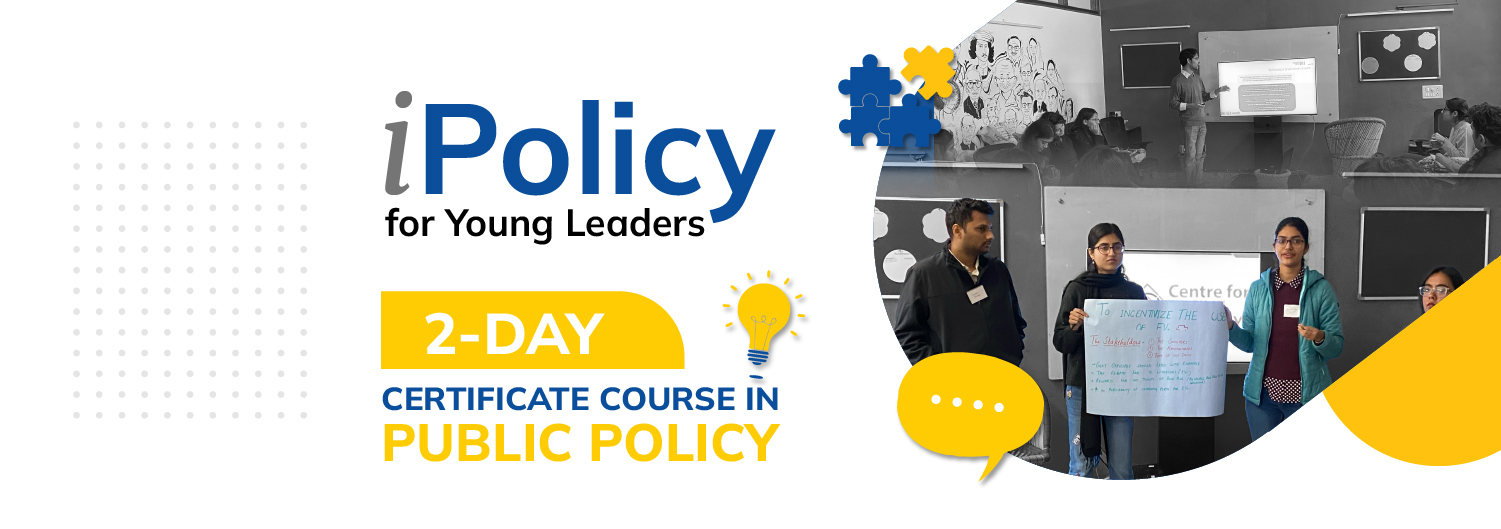About the Program
Have you ever wondered what makes a policy work?
Have you thought about the reason for India still being poor?
Have you questioned what the role of the government should be?
Explore these questions at iPolicy for Young Leaders- a 2-day certificate course in public policy organized by India's leading think tank Centre for Civil Society in four cities – Delhi, Mumbai, Hyderabad, and Bangalore.
iPolicy is an introductory course in Public Policy. The course structure involves a variety of interactive learning methods including dynamic games, talks, dialogues, and documentaries, designed to provide participants with opportunities to explore and share ideas about policy-based solutions to social problems from a liberal perspective.
Goals of iPolicy:
- To create an engaging, open, and respectful environment where everyone is encouraged to think critically about social, economic, and political issues.
- To evoke in participants a passionate inquiry into their own values and role in creating a good society.
- To equip participants with fundamental concepts of political economy and sound public policy and enable them to understand the root cause of current challenges and effectively champion for policy solutions through their profession.
- To plug participants into a global network of opportunities in order to propel their intellectual growth, make personal connections, and access resources to help them advance their vision of a free society.
- We have conducted this same program across premier institutions in India like ISB Hyderabad, FMS Delhi, NLS Bangalore, IIM Kozhikode, IIT Delhi, IIT Madras, IIT Bombay, Delhi School of Economics, and many more.
Eligibility
College students, young professionals, development leaders over the age of 18.
For any queries, email sourya@ccs.in
Faculty Profiles
Bhargavi Zaveri-Shah
Bhargavi Zaveri-Shah is a Senior Researcher at the Finance Research Group (FRG) at the Indira Gandhi Institute of Development Research (IGIDR). Her primary research area is financial regulation. She also works on land-related policy issues in Maharashtra. She has previously held research positions at the National Institute of Public Finance and Policy (NIPFP), New Delhi and the Harvard Law School. She was part of the team working on the Insolvency and Bankruptcy Code, the working group for setting up the Insolvency and Bankruptcy Board of India (IBBI), and has assisted in setting up India's first information utility. In the past, she has worked and published on institutional structures and regulatory governance in law-making processes in India. She regularly engages with the Ministry of Finance on various questions of financial regulation and policy. She is a lawyer by training.
Jerry Johnson
Jerry Johnson is an Indian writer and speaker engaged in exploring issues of diversity, culture, and issues of identity in a digital, global society. He has been a speaker at TEDxSinghagad, TEDxJHC, and the curator of TEDxChurchgate, which was Bombay's first TEDxCity 2.0 conference. He has also been a speaker at the Atlas Summit in Manchester, New Hampshire; the Asia Liberty Forum in Delhi; InfluencerCon in Mumbai; the Flashpoint Human Rights Film Festival; the India Non-Fiction Festival; the Tata Institute of Social Sciences; and at various other forums and colleges across the country. Jerry has published articles and provided commentary on major mainstream news channels in India, including Times Now, CNN-IBN, and BBC World, on matters ranging from free speech to LGBTQ rights. He has also co-authored the book "I Am Divine. So Are You" published by HarperCollins, which deals with affirming the dignity of queer lives within the frameworks of Indian religions. Jerry Johnson is a TFAS Fellow (The Fund for American Studies), having completed the Philosophy of Political Economy (PPE) program through George Mason University and the University of Hong Kong. More recently, he completed a program on Leadership and Political Economy in the Americas, from the Universidad De Los Andes, in Santiago, Chile, in South America. Jerry earned his Bachelor's degree in Communication from Roosevelt University in Chicago, with extensive academic work in Psychology and Philosophy. Currently, Jerry works for India's largest private corporation, focusing on organizational culture and communication.
Rajeswari Sengupta
Rajeswari Sengupta is currently an Associate Professor of Economics at the Indira Gandhi Institute of Development Research (IGIDR) in Mumbai, India. She obtained her Ph.D. in Economics from the University of California, Santa Cruz. In the past she has held research positions at the IFMR business school in Chennai, the International Monetary Fund and the World Bank in Washington DC, the San Francisco Federal Reserve Bank, and the Reserve Bank of India. She was a member of the research secretariat for the Bankruptcy Law Reforms Committee that proposed India's Insolvency and Bankruptcy Code, 2016. Her main areas of interest include international finance, monetary economics, banking sector, financial markets and firm financing. She has published papers in peer-reviewed journals including Economic Policy, The Journal of International Money and Finance, The World Economy, Emerging Markets Review, International Review of Economics and Finance, Pacific Economic Review, Open Economies Review and the Economic and Political Weekly. She has also written chapters in edited volumes published by the Asian Development Bank, and the G20 among others.
Sourya
Sourya is an Advocate licensed to practice in Delhi and has previously worked at a law firm in Hyderabad prior to joining the Centre for Civil Society. In addition to his four years of experience with CCS, he has provided legal and policy consultancy services to various non-profit social organizations, including the Red Elephant Foundation, Red Dot Foundation, and Tarunima Foundation. Sourya has received training as a Peacebuilder from UNESCO MGIEP and has also served as a Students for Liberty Local Coordinator in Hyderabad. He frequently writes and comments on law and policy, regulatory policy, and institutional economics, and in his free time, he runs a citizen journalism platform named Arguendo.
